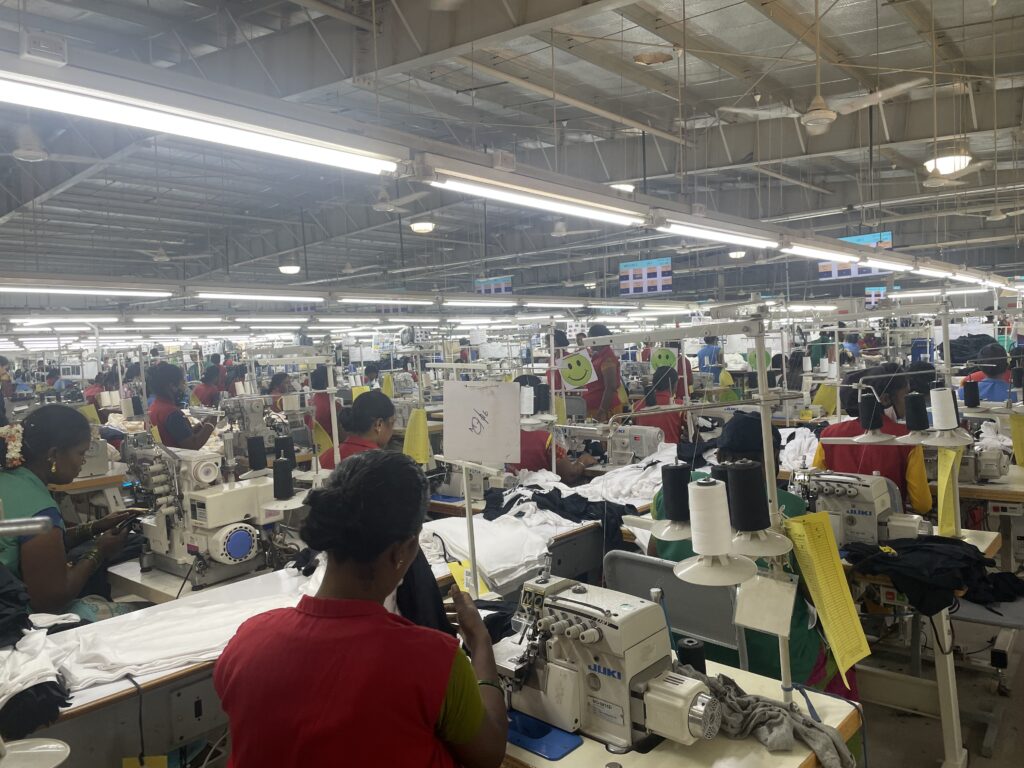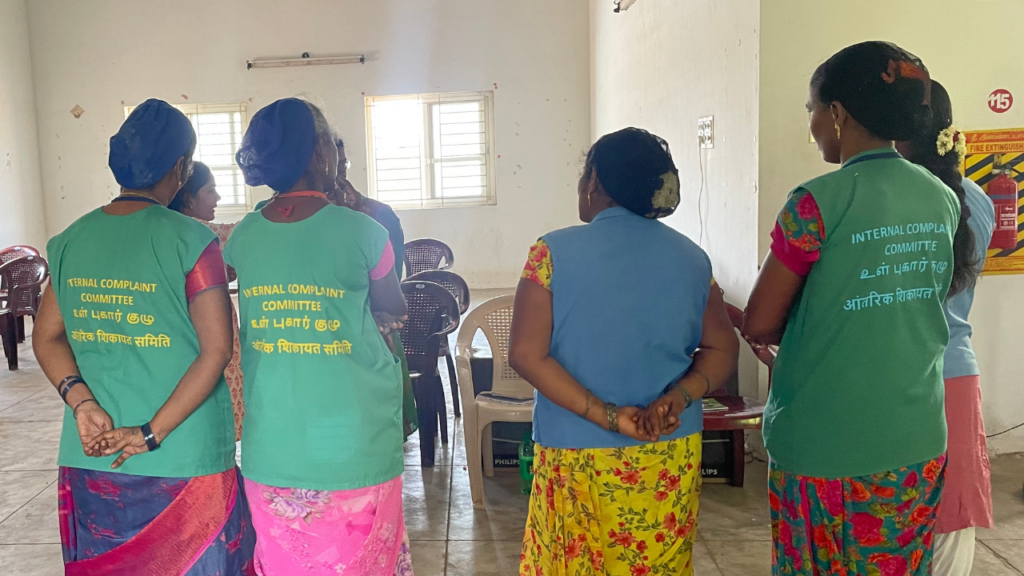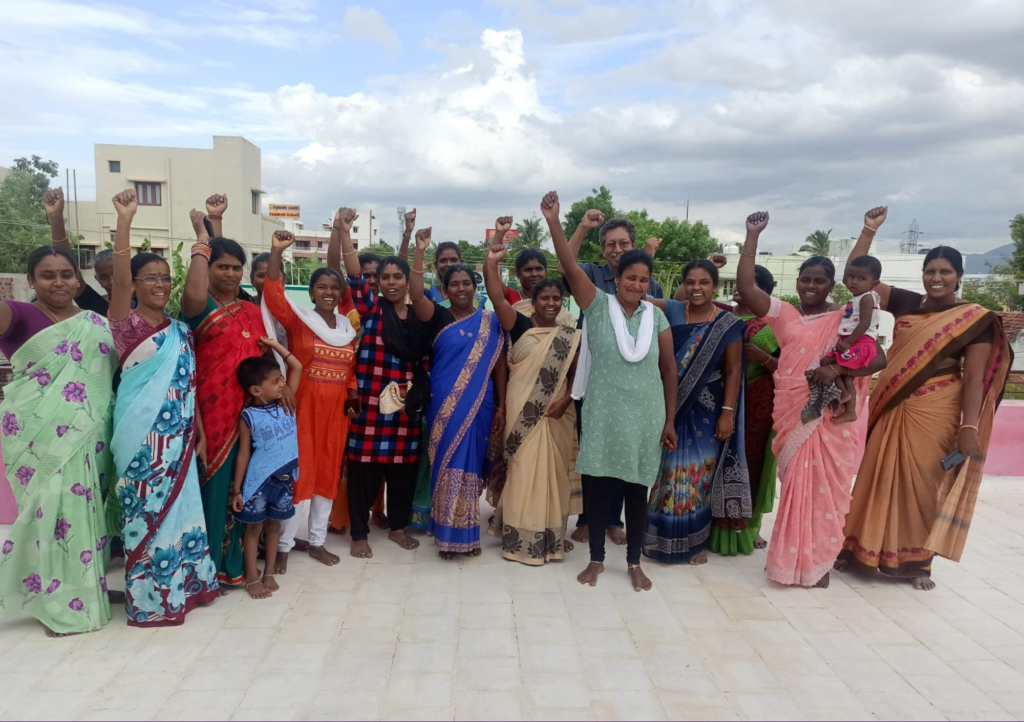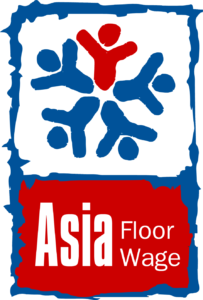Two years ago, a tragic event shook the garment industry in Dindigul, India, leading to a groundbreaking movement to end gender-based violence and harassment (GBVH) in the workplace. The #JusticeforJeyasre campaign, ignited by the sexual assault and murder of 21-year-old Jayasre Kathiravel by a male supervisor, culminated in the establishment of the Dindigul Agreement—a legally binding agreement among global fashion brands, suppliers, and unions. This agreement has since become a model for eradicating GBVH, enabling women’s agency, and fostering an ethical and equitable work environment in the world of work.
by Sinduri Sappanipillai, Asia Floor Wage Alliance (AFWA)
Lakshmi*, a worker at the Eastman Exports factory in Dindigul, greeted us with a smile that spoke volumes about the transformative power of the Dindigul Agreement. Having worked in the garment industry for over a decade, Lakshmi now engages with her supervisors confidently—a stark contrast to the fear and intimidation that once pervaded the workplace. “We used to see them with fear, but everything changed after the Dindigul Agreement. Now, we look them in the eye and answer confidently,” she said.
The Genesis of the Dindigul Agreement
Signed in 2022, the Dindigul Agreement is the first enforceable brand agreement (EBA) in India and a historic milestone in the Asian labor movement. It brought together the Tamil Nadu Textile and Common Labour Union (TTCU), Eastman Exports, Asia Floor Wage Alliance (AFWA), and Global Labor Justice (GLJ), and major global brands like H&M Group, Gap Inc., and PVH Corp. This coalition aimed to create a world of work free from violence and harassment, with a specific focus on the garment industry.
The agreement covers over 3500 workers at Natchi Apparel and Eastman Spinning Mills, the majority of whom are Dalit women. Many of the workers are also young migrants who live in company-owned dormitories and have faced severe discrimination and abuse. The Dindigul Agreement’s comprehensive approach, rooted in international labor standards like the International Labour Organization’s (ILO) C190 and R206, takes into account women’s agency in grievance handling and remediation; as well as ILO #C87 and #98 on Freedom of Association. It also aligns with the Organisation for Economic Co-operation and Development (OECD) guidelines and India’s 2013 Prevention of Sexual Harassment (POSH) Act, making it a model for implementing international labor standards in the workplace.

Groundbreaking Mechanisms for GBVH Prevention
The Dindigul Agreement introduced the AFWA Safe Circle approach, a worker and union-led training, monitoring, and remediation program. Worker Shop Floor Monitors (SFMs), trained by TTCU, play a critical role in this system, helping co-workers report GBVH and facilitating regular meetings with management to resolve issues. This proactive approach has led to a significant reduction in GBVH incidents, with 98% of the 185 grievances raised in the first year being resolved, including all 23 GBVH cases.
Read the first year progress report here.
Latha*, a shop floor monitor, highlighted the effectiveness of this system: “Women workers now come forward and share their problems with us, knowing we are here to listen and provide solutions. Any small issue is usually resolved within a few hours. If there’s something we can’t solve, we bring it to management and ensure it is resolved within 2-3 days.”
The agreement has catalyzed profound cultural and behavioral changes in the workplace. Mid-managers and supervisors have significantly altered their behavior towards workers, fostering a more respectful and inclusive environment. This shift has not only improved worker relations but also led to a notable reduction in the factory’s attrition rate by 67% between 2021 and 2022, benefiting both workers and business operations. A detailed report of the second year’s progress is underway.
The impact of the Dindigul Agreement extends beyond factory floors, contributing to the global effort to eliminate GBVH and other rights violations by enabling women to actively address and prevent instances of GBVH. Women workers in their testimonies share how they found the courage to confront and prevent instances of GBVH in their workplaces, transport facilities, hostels, and communities.
Strengthening FOA and Grievance Mechanisms
Recognizing the essential role of Freedom of Association (FOA) in preventing GBVH, the agreement explicitly protects workers’ rights to form and join unions. This protection has enabled workers to speak out and report grievances without fear of retaliation, ensuring timely and effective resolutions.

Thenmozhi*, a quality checker at the factory, emphasized the importance of this support system: “Earlier, we were scared, fearing trouble and retaliation for speaking out. But now, we have a support system. We can go to SFMs for any issues, and they resolve them for us. We also have the Internal Complaints Committee (ICC) now. The agreement has helped us understand our rights and has made us confident.”
Recommendations for Brands:
Each signatory and stakeholder in the agreement has made measurable and visible contributions:
- AFWA and GLJ have been instrumental in guiding and directing both the union and supplier to ensure the agreement’s implementation.
- TTCU has supported SFMs, enabling them to address workers’ concerns and grievances on the shop floor. TTCU also actively engages in resolving worker issues through union-management dialogue.
- Eastman has ensured compliance with remediation efforts and the implementation of corrective action plans.
- Independent Assessors have been involved in strengthening the ICC and ensuring the grievance mechanism is effectively in place.
Going forward, here are some recommendations for brands to take a more visible and active role in the agreement process. They should reward suppliers like Eastman, where worker unions are accepted, and where grievance mechanisms have had unprecedented success in GBVH-related grievance remediation. By prioritizing orders from factories that uphold worker-friendly practices, brands can support and incentivize ethical workplace practices. This visible commitment will send a strong message of support for worker rights and protections, demonstrating a genuine global effort to safeguard worker-driven grievance mechanisms and promote an equitable work environment.

A Call to Action for Global Brands
The Dindigul Agreement has proven to be a transformative model for eradicating GBVH. Its positive impact over the past two years has helped to strengthen workers’ rightful voice at work and fostered a more stable and ethical supply chain. This landmark agreement highlights the need for more brands to support its expansion and replication, ensuring a safe and equitable workplace. The tragic murder of Jeyasre Kathiravel underscores the urgency for such protections, and the agreement’s success proves that the industry can evolve for the better, and safeguard the dignity and rights of every worker.
*To protect the privacy of certain individuals, names and identifying details have been changed.
